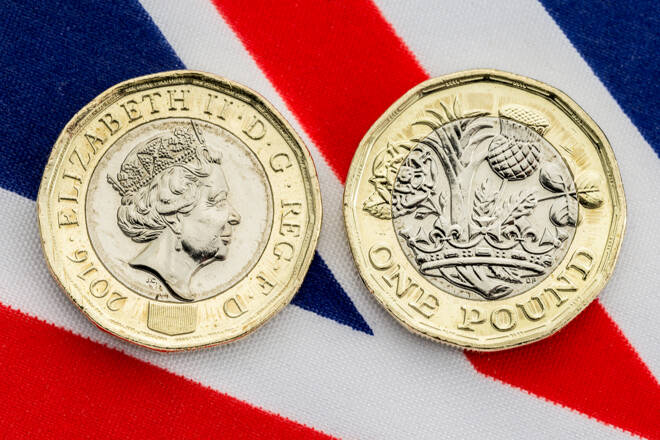Advertisement
Advertisement
GBP to USD Forecast: Sterling Awaits Direction as GDP Numbers Loom
By:
The GBP/USD pair seeks respite amidst looming UK GDP reports and potent US inflation figures, influencing both Sterling value and investor sentiment.
Highlights
- GBP/USD rebounded on Thursday, ending a six-day slump; closed at $1.21975.
- The precarious Pound’s fate hinges on incoming economic indicators.
- Upbeat US spending predictions underscore ongoing inflationary pressures.
Overview of the Thursday Session
On Thursday, the GBP/USD pair gained 0.51%. Reversing a 0.19% loss from Wednesday, the GBP/USD pair ended the session at $1.21975. The GBP/USD pair fell to a low of $1.21197 before reaching a high of $1.22246. Notably, the GBP/USD pair ended a six-day losing streak.
UK GDP Report to Test Buyer Appetite at $1.22
Later today, the UK GDP report will garner investor interest. Negative sentiment toward the UK economy has significantly weakened the Pound. A dovish Bank of England has intensified the vulnerability of the Pound against the dollar.
UK GDP numbers for the second quarter could offer some respite. According to prelim figures, the UK economy expanded by 0.2% in Q2 versus 0.1% in Q1. Revisions to prelim numbers will influence investor sentiment.
Upward revisions to second-quarter GDP numbers could ease fears of a deep and prolonged UK recession.
However, any relief may be brief. Recent UK economic indicators signaled a deteriorating macroeconomic environment. Significantly, the effects of aggressive Bank of England interest rate hikes must filter through the economy before support for the GBP/USD can return with conviction.
US Inflation and Consumption in Focus
Later today, the US Personal Income & Outlays Report will influence investor sentiment toward the Fed interest rate trajectory.
Higher-than-forecasted personal spending and Core PCE Price Index figures would increase expectations for a December Fed rate hike. Economists forecast US personal spending to increase by 0.4% versus a rise of 0.8% in July. However, economists predict the Core PCE Index to rise by 3.9% year-over-year in August versus 4.2% in July.
Personal spending and income predictions are upbeat, exposing the GBP/USD to the sticky inflation phenomenon.
An uptrend in income and spending would fuel demand-driven inflationary pressures. A more hawkish Fed interest rate path would reduce disposable income, forcing consumers to curb spending.
An unexpected slump in personal spending and softer-than-forecast inflation figures could reignite fears of a hard landing.
US private consumption expenditures make up more than 65% of the US GDP. A downward trend in consumption would sway expectations of a resilient US economy and a hawkish Fed.
Short-Term Forecast
Monetary policy and economic divergence remain firmly tilted in favor of the US dollar. However, the US Personal Income and Outlays Report and the US Jobs Report, out next week, must support the projected Fed interest rate path to continue pressuring the GBP/USD pair.
GBP to USD Price Action
Daily Chart
The GBP/USD pair sat below the 50-day and 200-day EMAs, affirming bearish price signals. A GBP/USD breakout from the $1.22150 resistance level would support a move toward the $1.24410 resistance level.
Weaker-than-expected US economic indicators would fuel a GBP/USD breakout.
However, a pullback from the $1.22150 resistance level would support a GBP/USD move toward the $1.19055 support level.
The 14-period daily RSI reading of 31.37 suggests the GBP/USD pair could fall below $1.22 before reaching oversold territory.
4-Hourly Chart
The GBP/USD sits below the 50-day and 200-day EMAs, reaffirming bearish price signals. A break above the 50-day EMA would support a GBP/USD return to $1.23.
However, failure to move through the 50-day EMA would support a pullback from the $1.22150 resistance level to give the bears a run at $1.21500.
With a 57.04 reading on the 14-period 4-hourly RSI, the GBP/USD could rise above the 50-day EMA before reaching overbought conditions.
About the Author
Bob Masonauthor
With over 28 years of experience in the financial industry, Bob has worked with various global rating agencies and multinational banks. Currently he is covering currencies, commodities, alternative asset classes and global equities, focusing mostly on European and Asian markets.
Advertisement
